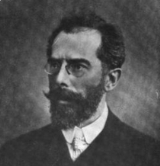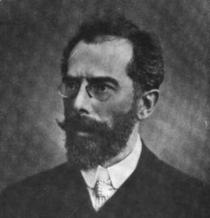
Franz Schalk
Encyclopedia

Austria
Austria , officially the Republic of Austria , is a landlocked country of roughly 8.4 million people in Central Europe. It is bordered by the Czech Republic and Germany to the north, Slovakia and Hungary to the east, Slovenia and Italy to the south, and Switzerland and Liechtenstein to the...
n conductor
Conducting
Conducting is the art of directing a musical performance by way of visible gestures. The primary duties of the conductor are to unify performers, set the tempo, execute clear preparations and beats, and to listen critically and shape the sound of the ensemble...
. From 1918 to 1929 he was director of the Vienna State Opera
Vienna State Opera
The Vienna State Opera is an opera house – and opera company – with a history dating back to the mid-19th century. It is located in the centre of Vienna, Austria. It was originally called the Vienna Court Opera . In 1920, with the replacement of the Habsburg Monarchy by the First Austrian...
, a post he held jointly with Richard Strauss
Richard Strauss
Richard Georg Strauss was a leading German composer of the late Romantic and early modern eras. He is known for his operas, which include Der Rosenkavalier and Salome; his Lieder, especially his Four Last Songs; and his tone poems and orchestral works, such as Death and Transfiguration, Till...
from 1919 to 1924. Later, Schalk was involved in the establishment of the Salzburg Festival
Salzburg Festival
The Salzburg Festival is a prominent festival of music and drama established in 1920. It is held each summer within the Austrian town of Salzburg, the birthplace of Wolfgang Amadeus Mozart...
.
Biography
Schalk was born in ViennaVienna
Vienna is the capital and largest city of the Republic of Austria and one of the nine states of Austria. Vienna is Austria's primary city, with a population of about 1.723 million , and is by far the largest city in Austria, as well as its cultural, economic, and political centre...
, Austria
Austria
Austria , officially the Republic of Austria , is a landlocked country of roughly 8.4 million people in Central Europe. It is bordered by the Czech Republic and Germany to the north, Slovakia and Hungary to the east, Slovenia and Italy to the south, and Switzerland and Liechtenstein to the...
, where he later studied under composer
Composer
A composer is a person who creates music, either by musical notation or oral tradition, for interpretation and performance, or through direct manipulation of sonic material through electronic media...
Anton Bruckner
Anton Bruckner
Anton Bruckner was an Austrian composer known for his symphonies, masses, and motets. The first are considered emblematic of the final stage of Austro-German Romanticism because of their rich harmonic language, complex polyphony, and considerable length...
. From 1900 he was first kapellmeister
Kapellmeister
Kapellmeister is a German word designating a person in charge of music-making. The word is a compound, consisting of the roots Kapelle and Meister . The words Kapelle and Meister derive from the Latin: capella and magister...
of the Vienna Court Opera
Vienna State Opera
The Vienna State Opera is an opera house – and opera company – with a history dating back to the mid-19th century. It is located in the centre of Vienna, Austria. It was originally called the Vienna Court Opera . In 1920, with the replacement of the Habsburg Monarchy by the First Austrian...
. Between 1904 and 1921 he was head of the Gesellschaft der Musikfreunde
Gesellschaft der Musikfreunde
The Gesellschaft der Musikfreunde in Wien , was founded in 1812 by Joseph von Sonnleithner, general secretary of the Court Theatre, Vienna, Austria. Its official charter, drafted in 1814, states that the purpose of the Society was to promote music in all its facets...
Vienna. In 1918 he became director of the Vienna State Opera; however from 1919 he was co-director with Richard Strauss, and the well-known composer was "blatantly (though unofficially) the 'greater equal' of the pair". Tensions resulting from unclear division of responsibility between the two men eventually led to Strauss's resignation.
Schalk's most famous quote is "Every theatre is an insane asylum, but an opera theatre is the ward for the incurables."
Today Schalk is most famous for his work popularizing and revising the symphonies of his teacher Bruckner. He gave the premiere of Bruckner's Symphony No. 5
Symphony No. 5 (Bruckner)
The Symphony No. 5 in B flat major of Anton Bruckner was written in 1875–1876, with a few minor changes over the next few years. It was first performed in public on two pianos by Joseph Schalk and Franz Zottmann on 20 April 1887 at the Bösendorfersaal in Vienna...
in 1894, but in a version much affected by cuts and changes, most of which are thought to have been made without Bruckner's approval. The ailing composer was too sick to attend the premiere. Schalk's version of the Fifth Symphony was the one chosen for first publication and was the only version heard by audiences for almost forty years. While many critics have attacked Schalk for his alterations to the original versions of Bruckner's works, others have pointed out that, without his popularizing work, Bruckner's music might have remained unknown. The conductor Leon Botstein
Leon Botstein
Leon Botstein is an American conductor and the President of Bard College . Botstein is the music director and principal conductor of the American Symphony Orchestra and conductor laureate of the Jerusalem Symphony Orchestra, where he served as music director and principal conductor from 2003-2010...
is a prominent advocate of Schalk's versions of Bruckner's music.
Schalk was also involved in the early publication of Mahler
Gustav Mahler
Gustav Mahler was a late-Romantic Austrian composer and one of the leading conductors of his generation. He was born in the village of Kalischt, Bohemia, in what was then Austria-Hungary, now Kaliště in the Czech Republic...
's Symphony No. 10
Symphony No. 10 (Mahler)
The Symphony No. 10 by Gustav Mahler was written in the summer of 1910, and was his final composition. At the time of Mahler's death the composition was substantially complete in the form of a continuous draft; but not being fully elaborated at every point, and mostly not orchestrated, it was not...
. Schalk gave the premiere of Richard Strauss
Richard Strauss
Richard Georg Strauss was a leading German composer of the late Romantic and early modern eras. He is known for his operas, which include Der Rosenkavalier and Salome; his Lieder, especially his Four Last Songs; and his tone poems and orchestral works, such as Death and Transfiguration, Till...
's opera Die Frau ohne Schatten
Die Frau ohne Schatten
Die Frau ohne Schatten is an opera in three acts by Richard Strauss with a libretto by his long-time collaborator, the poet Hugo von Hofmannsthal. It was written between 1911 and either 1915 or 1917...
in 1919.
He died in 1931, aged 68. Some of his work as a conductor has been preserved and is available on CD. Schalk's elder brother Joseph
Joseph Schalk
Joseph Schalk was an Austrian conductor, musicologist and pianist. His name is often given as Josef Schalk....
was also a prominent conductor and musician.
External links
- Franz Schalk at the aeiou EncyclopediaAeiou EncyclopediaAEIOU is a free online collection of reference works in both German and English about Austria-related topics.-Background:...
- An article about Bruckner, written from a pro-Schalk viewpoint
- Available recordings

